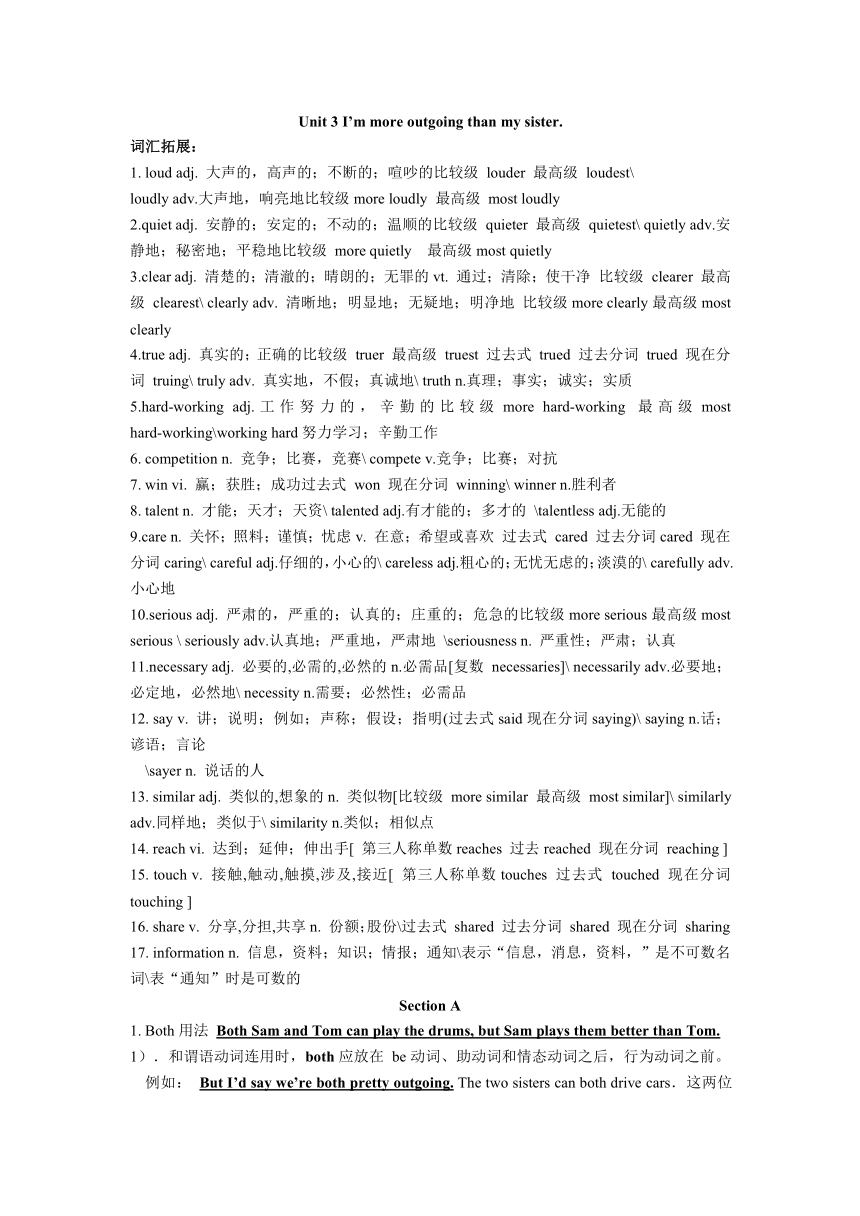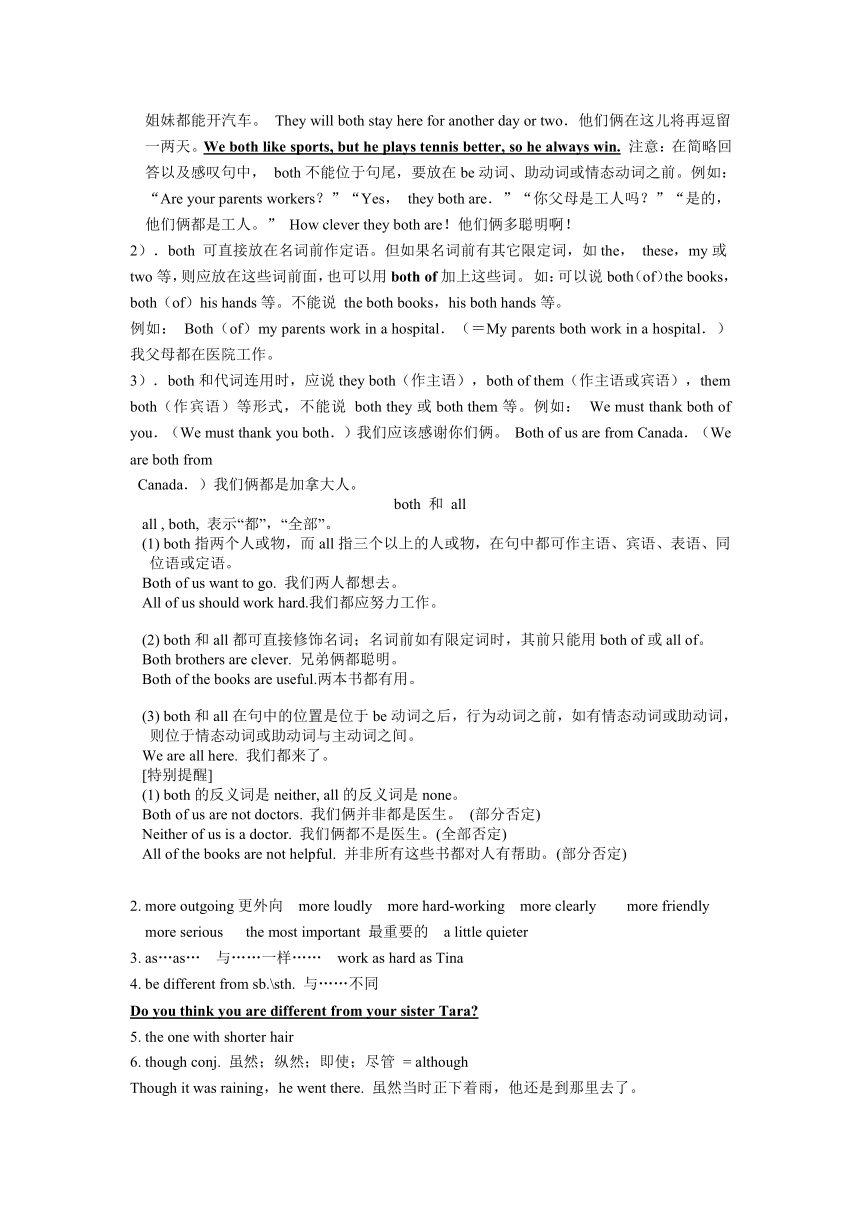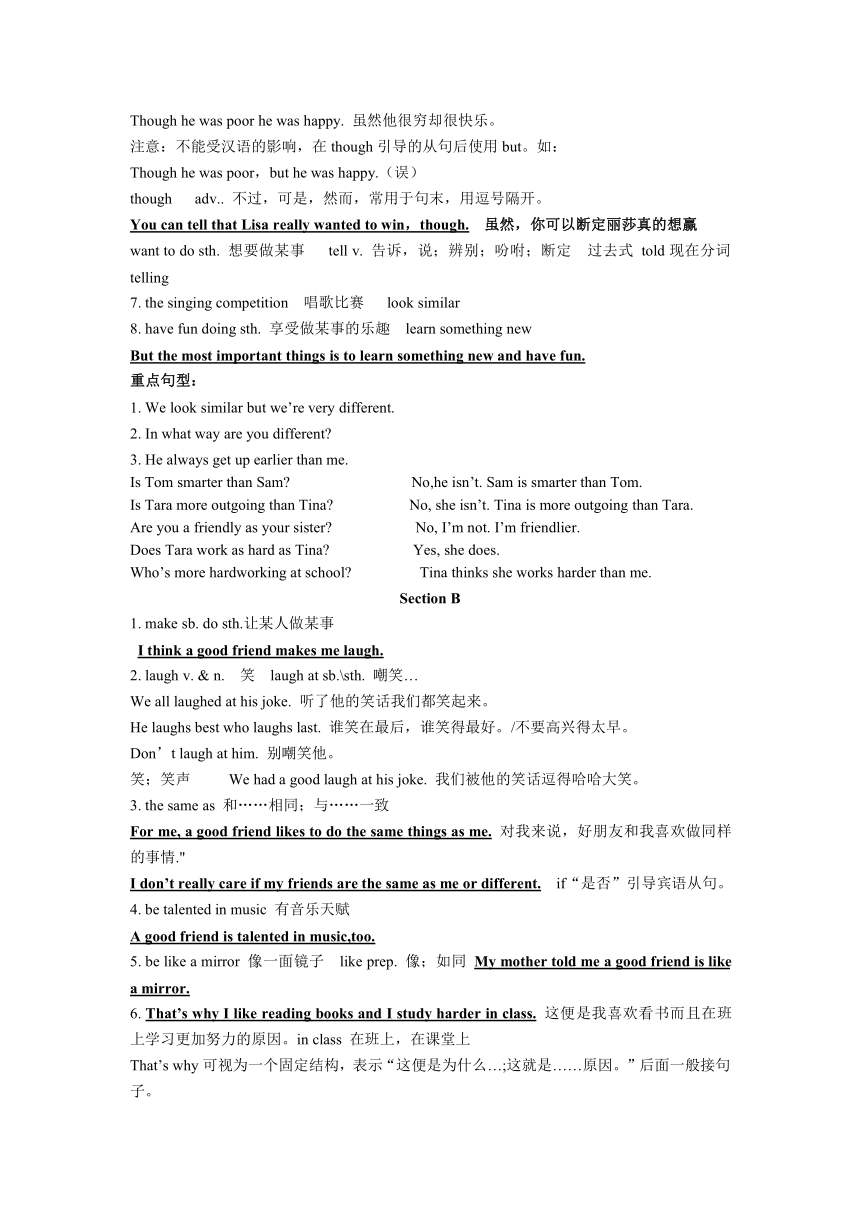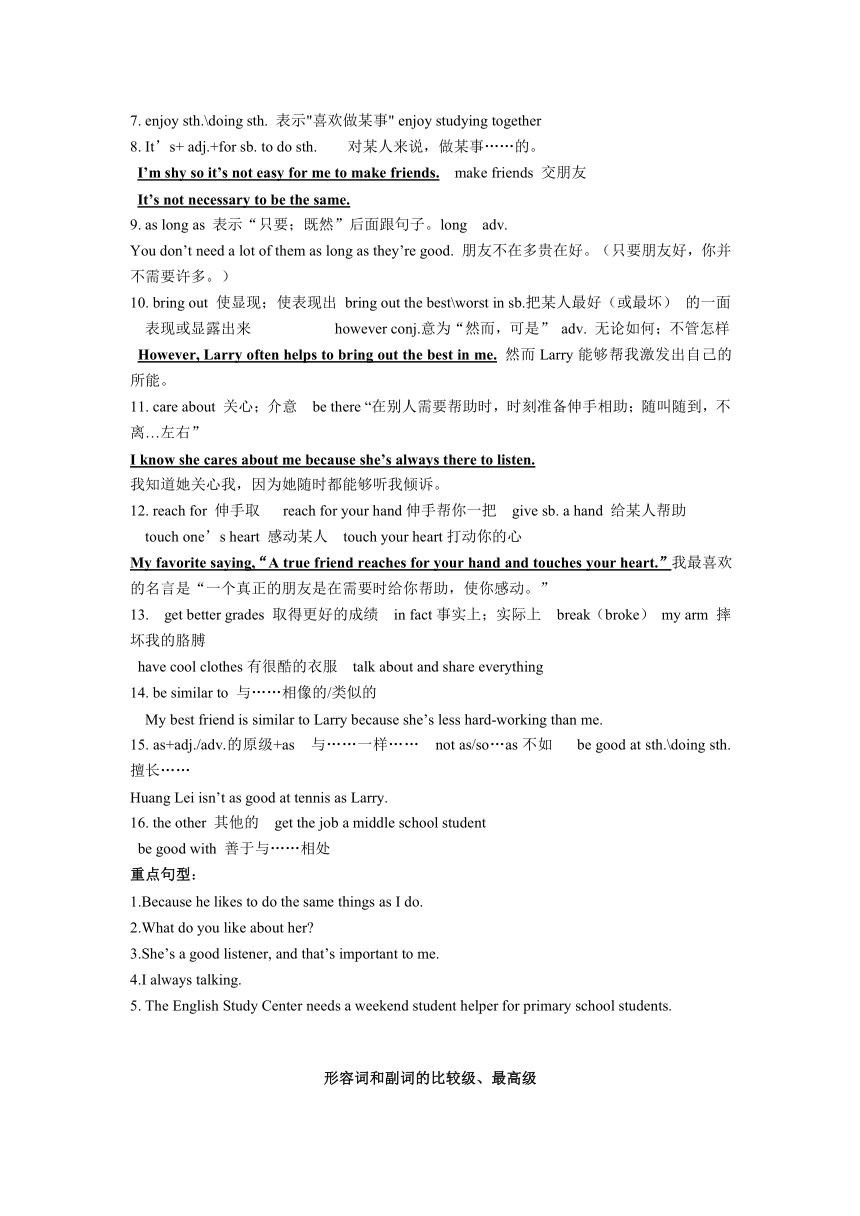八年级上Unit3 I’m more outgoing than my sister.期末复习学案(词汇+语法+句型)
文档属性
| 名称 | 八年级上Unit3 I’m more outgoing than my sister.期末复习学案(词汇+语法+句型) |  | |
| 格式 | zip | ||
| 文件大小 | 23.0KB | ||
| 资源类型 | 教案 | ||
| 版本资源 | 人教新目标(Go for it)版 | ||
| 科目 | 英语 | ||
| 更新时间 | 2014-01-13 17:19:28 | ||
图片预览




文档简介
Unit 3 I’m more outgoing than my sister.
词汇拓展:
1. loud adj. 大声的,高声的;不断的;喧吵的比较级 louder 最高级 loudest\
loudly adv.大声地,响亮地比较级more loudly 最高级 most loudly
2.quiet adj. 安静的;安定的;不动的;温顺的比较级 quieter 最高级 quietest\ quietly adv.安静地;秘密地;平稳地比较级 more quietly 最高级most quietly
3.clear adj. 清楚的;清澈的;晴朗的;无罪的vt. 通过;清除;使干净 比较级 clearer 最高级 clearest\ clearly adv. 清晰地;明显地;无疑地;明净地 比较级more clearly最高级most clearly
4.true adj. 真实的;正确的比较级 truer 最高级 truest 过去式 trued 过去分词 trued 现在分词 truing\ truly adv. 真实地,不假;真诚地\ truth n.真理;事实;诚实;实质
5.hard-working adj.工作努力的,辛勤的比较级more hard-working 最高级most hard-working\working hard努力学习;辛勤工作
6. competition n. 竞争;比赛,竞赛\ compete v.竞争;比赛;对抗
7. win vi. 赢;获胜;成功过去式 won 现在分词 winning\ winner n.胜利者
8. talent n. 才能;天才;天资\ talented adj.有才能的;多才的 \talentless adj.无能的
9.care n. 关怀;照料;谨慎;忧虑v. 在意;希望或喜欢 过去式 cared 过去分词cared 现在分词caring\ careful adj.仔细的,小心的\ careless adj.粗心的;无忧无虑的;淡漠的\ carefully adv.小心地
10.serious adj. 严肃的,严重的;认真的;庄重的;危急的比较级more serious最高级most serious \ seriously adv.认真地;严重地,严肃地 \seriousness n. 严重性;严肃;认真
11.necessary adj. 必要的,必需的,必然的n.必需品[复数 necessaries]\ necessarily adv.必要地;必定地,必然地\ necessity n.需要;必然性;必需品
12. say v. 讲;说明;例如;声称;假设;指明(过去式said现在分词saying)\ saying n.话;谚语;言论
\sayer n. 说话的人
13. similar adj. 类似的,想象的n. 类似物[比较级 more similar 最高级 most similar]\ similarly adv.同样地;类似于\ similarity n.类似;相似点
14. reach vi. 达到;延伸;伸出手[ 第三人称单数reaches 过去reached 现在分词 reaching ]
15. touch v. 接触,触动,触摸,涉及,接近[ 第三人称单数touches 过去式 touched 现在分词 touching ]
16. share v. 分享,分担,共享n. 份额;股份\过去式 shared 过去分词 shared 现在分词 sharing
17. information n. 信息,资料;知识;情报;通知\表示“信息,消息,资料,”是不可数名词\表“通知”时是可数的
Section A
1. Both用法 Both Sam and Tom can play the drums, but Sam plays them better than Tom.
1).和谓语动词连用时,both应放在 be动词、助动词和情态动词之后,行为动词之前。例如: But I’d say we’re both pretty outgoing. The two sisters can both drive cars.这两位姐妹都能开汽车。 They will both stay here for another day or two.他们俩在这儿将再逗留一两天。We both like sports, but he plays tennis better, so he always win. 注意:在简略回答以及感叹句中, both不能位于句尾,要放在be动词、助动词或情态动词之前。例如: “Are your parents workers?”“Yes, they both are.”“你父母是工人吗?”“是的,他们俩都是工人。” How clever they both are!他们俩多聪明啊!
2).both 可直接放在名词前作定语。但如果名词前有其它限定词,如the, these,my或two等,则应放在这些词前面,也可以用both of加上这些词。 如:可以说both(of)the books,both(of)his hands等。不能说 the both books,his both hands等。
例如: Both(of)my parents work in a hospital.(=My parents both work in a hospital.)我父母都在医院工作。
3).both和代词连用时,应说they both(作主语),both of them(作主语或宾语),them both(作宾语)等形式,不能说 both they或both them等。例如: We must thank both of you.(We must thank you both.)我们应该感谢你们俩。 Both of us are from Canada.(We are both from
Canada.)我们俩都是加拿大人。
both 和 all
all , both, 表示“都”,“全部”。
(1) both指两个人或物,而all指三个以上的人或物,在句中都可作主语、宾语、表语、同位语或定语。
Both of us want to go. 我们两人都想去。
All of us should work hard.我们都应努力工作。
(2) both和all都可直接修饰名词;名词前如有限定词时,其前只能用both of或all of。
Both brothers are clever. 兄弟俩都聪明。
Both of the books are useful.两本书都有用。
(3) both和all在句中的位置是位于be动词之后,行为动词之前,如有情态动词或助动词,则位于情态动词或助动词与主动词之间。
We are all here. 我们都来了。
[特别提醒]
(1) both的反义词是neither, all的反义词是none。
Both of us are not doctors. 我们俩并非都是医生。 (部分否定)
Neither of us is a doctor. 我们俩都不是医生。(全部否定)
All of the books are not helpful. 并非所有这些书都对人有帮助。(部分否定)
2. more outgoing更外向 more loudly more hard-working more clearly more friendly
more serious the most important 最重要的 a little quieter
3. as…as… 与……一样…… work as hard as Tina
4. be different from sb.\sth. 与……不同
Do you think you are different from your sister Tara
5. the one with shorter hair
6. though conj. 虽然;纵然;即使;尽管 = although
Though it was raining,he went there. 虽然当时正下着雨,他还是到那里去了。
Though he was poor he was happy. 虽然他很穷却很快乐。
注意:不能受汉语的影响,在though引导的从句后使用but。如:
Though he was poor,but he was happy.(误)
though adv.. 不过,可是,然而,常用于句末,用逗号隔开。
You can tell that Lisa really wanted to win,though. 虽然,你可以断定丽莎真的想赢
want to do sth. 想要做某事 tell v. 告诉,说;辨别;吩咐;断定 过去式 told现在分词 telling
7. the singing competition 唱歌比赛 look similar
8. have fun doing sth. 享受做某事的乐趣 learn something new
But the most important things is to learn something new and have fun.
重点句型:
1. We look similar but we’re very different.
2. In what way are you different
3. He always get up earlier than me.
Is Tom smarter than Sam No,he isn’t. Sam is smarter than Tom.
Is Tara more outgoing than Tina No, she isn’t. Tina is more outgoing than Tara.
Are you a friendly as your sister No, I’m not. I’m friendlier.
Does Tara work as hard as Tina Yes, she does.
Who’s more hardworking at school Tina thinks she works harder than me.
Section B
1. make sb. do sth.让某人做某事
I think a good friend makes me laugh.
2. laugh v. & n. 笑 laugh at sb.\sth. 嘲笑…
We all laughed at his joke. 听了他的笑话我们都笑起来。
He laughs best who laughs last. 谁笑在最后,谁笑得最好。/不要高兴得太早。
Don’t laugh at him. 别嘲笑他。
笑;笑声 We had a good laugh at his joke. 我们被他的笑话逗得哈哈大笑。
3. the same as 和……相同;与……一致
For me, a good friend likes to do the same things as me. 对我来说,好朋友和我喜欢做同样的事情."
I don’t really care if my friends are the same as me or different. if“是否”引导宾语从句。
4. be talented in music 有音乐天赋
A good friend is talented in music,too.
5. be like a mirror 像一面镜子 like prep. 像;如同 My mother told me a good friend is like a mirror.
6. That’s why I like reading books and I study harder in class. 这便是我喜欢看书而且在班上学习更加努力的原因。in class 在班上,在课堂上
That’s why可视为一个固定结构,表示“这便是为什么…;这就是……原因。”后面一般接句子。
7. enjoy sth.\doing sth. 表示"喜欢做某事" enjoy studying together
8. It’s+ adj.+for sb. to do sth. 对某人来说,做某事……的。
I’m shy so it’s not easy for me to make friends. make friends 交朋友
It’s not necessary to be the same.
9. as long as 表示“只要;既然”后面跟句子。long adv.
You don’t need a lot of them as long as they’re good. 朋友不在多贵在好。(只要朋友好,你并不需要许多。)
10. bring out 使显现;使表现出 bring out the best\worst in sb.把某人最好(或最坏) 的一面表现或显露出来 however conj.意为“然而,可是” adv. 无论如何;不管怎样
However, Larry often helps to bring out the best in me. 然而Larry能够帮我激发出自己的所能。
11. care about 关心;介意 be there “在别人需要帮助时,时刻准备伸手相助;随叫随到,不离…左右”
I know she cares about me because she’s always there to listen.
我知道她关心我,因为她随时都能够听我倾诉。
12. reach for 伸手取 reach for your hand伸手帮你一把 give sb. a hand 给某人帮助
touch one’s heart 感动某人 touch your heart打动你的心
My favorite saying,“A true friend reaches for your hand and touches your heart.”我最喜欢的名言是“一个真正的朋友是在需要时给你帮助,使你感动。”
13. get better grades 取得更好的成绩 in fact事实上;实际上 break(broke) my arm 摔坏我的胳膊
have cool clothes有很酷的衣服 talk about and share everything
14. be similar to 与……相像的/类似的
My best friend is similar to Larry because she’s less hard-working than me.
15. as+adj./adv.的原级+as 与……一样…… not as/so…as不如 be good at sth.\doing sth. 擅长……
Huang Lei isn’t as good at tennis as Larry.
16. the other 其他的 get the job a middle school student
be good with 善于与……相处
重点句型:
1.Because he likes to do the same things as I do.
2.What do you like about her
3.She’s a good listener, and that’s important to me.
4.I always talking.
5. The English Study Center needs a weekend student helper for primary school students.
形容词和副词的比较级、最高级
大多数形容词和副词有三个等级:1)原级(不作比较),修饰词very, so, too, pretty, really;2)比较级,表示“较……”或“更……”的意思(两者之间进行比较), 标志词than, A or B, of the two, 修饰词much, a lot, a little;3)最高级,表示“最……”的意思(三者或三者以上作比较),形容词最高级前面一般要加定冠词the,后面可带in(of)短语来什么比较的范围。
形容词和副词的比较级和最高级规则变化:构 成 方 法
1.原 级 比 较 级 最 高 级 单音 节词 和部 分双 音节 词 一般在词尾加-er或-est
high short higher shorter highest shortest
2.以字母e词尾的词,加-r或-st late fine later finest latest finest
3.重读闭音节词词尾只有一个辅音字母时,先双写辅音字母,再加-er或-est
hot big thin fat hotter bigger thinner fatter hottest biggest thinnest fattest
4.以“辅音字母+y”结尾的双音节词,先把“y”改为“i”,再加 -er或-est
funny easy early funnier easier earlier funniest easiest earliest
5.多音节词和部分双音节词 在词前加more或most
beautiful athletic outgoing more beautiful more athletic more outgoing most beautiful most athletic most outgoing
形容词和副词的比较级和最高级不规则变化:
原 级 比较级 最高级
good/well better best
bad/badly worse worst
many/much more most
little less least
far farther(更远\further(更深远) farthest(最远)\furthest(最深远)
形容词和副词的原级、比较级和最高级的用法总结
(1)讲述某人/物自身的情况时,用原级。基本句型是: 主语(sb./sth) + 谓语动词 + (very/too/so/quite/rather…) + 形容词/副词原级 +…. 如:He is very old now.(他现在很老了)
They ran quite fast.(它们跑得相当快)
The weather looks rather bad.(天气看上去相当糟)
I am so happy!(我是如此的快乐)
(2)☆表示两者之间没有差别时,使用句型: 主语(第一个人物) + 谓语动词 + as + 形容词/副词原级 + as + 第二个人物 +….
如:He is as excited as his younger sister.(他和他妹妹一样兴奋)
Lily rode her bike as slowly as an old lady.(莉莉骑车像老太太一样慢)
They picked as many apples as the farmers (did).(他们摘的苹果和农民一样多)
(3)☆表示第一个人比不上第二个人时,使用句型: 主语(第一个人物) + 谓语动词(否定式) + as / so + 形容词/副词原级 + as + 第二个人物+….
如:He is not so / as excited as his younger sister.(他没他妹妹那么兴奋)
Lily did not ride her bike so / as slowly as an old lady. (莉莉骑车不像老太太那样慢)
They didn’t pick so / as many apples as the farmers (did). (他们摘的苹果不如农民多)
(4) 讲述两者有差异,第一个人物超过第二个人物时,用比较级。基本句型: 主语(‘A’)+谓语动词+(much/a little/even/still)+形容词/副词比较级+than+第二个人物(‘B’)+….
如:A modern train is much faster than a car.(现代的火车比轿车快多了)
This book didn’t cost me more than that one.(这本书花费我的钱不比那本多)
(5)讲述两者有差异,第一个人物不及第二个人物时,用比较级。句型是: 主语(‘A’) + 谓语动词 + less+ (多音节形/副)比较级 + than + 第二个人物(‘B’) +…. 如:I think English is less difficult than maths.(我认为英语不比数学难)
Do you think it less important to learn a foreign language (你认为学外语不那么重要吗?
(6)讲述某人/物是一群之中最突出的一个时,用最高级。句型是: 主语(sb./sth) + 谓语动词 +(the) +形容词/副词最高级 +in / of ….
如:The Changjiang River is the longest in China.(长江是中国最长的河流)
He jumped (the) highest of the three (boys).(三个男生中他跳得最高)
回顾:原级的构成和用法
l)构成:形容词,副词的原级形式是形容词
2)用法:表示双方在程度,性质,特征等某方面相等时,用" as 十原级形容词或副词十 as"的结构;
表示双方不相等时,用" not so (as)十原级形容词或副词十 as"的结构;
3)表示一方是另一方的若干倍时,用"倍数十 as十原级形容词或副词十 as"的结构.
e.g. Ms.Sun speaks English as fluently as you.
This building looks not so (as) high as that one.
This room is three times as large as that one.
提到倍数用法,补充:表示倍数的比较级有如下几种句型:
1) A is three(four,etc) times as big(high,long,wide,etc.) as B.如:Asia is four times as lareg as Europe,亚洲是欧洲的四倍大.(亚洲比欧洲大三倍.)
2) A is three(four,ete) times the size(height,length,width,ete) of B.如;The new building is four times the size( the height) of the old one.这座新楼是那座旧楼的四倍大(四倍高)。(这座新楼比那座旧楼大三倍[高三倍]).
3) A is three(four,etc.) times bigger ( higher,longer,wider,etc.) than B.如:Your school is three times bigger than ours,你们的学校比我们的学校大三倍.(你们的学校是我们学校的四倍大.)用 times表示倍数,一般只限于表示包括基数在内三倍或三倍以上的数.表示两倍可以用 twice或 double
little/few和many/much的比较级和最高级以及用法
1)little less least修饰不可数名词
2)few fewer fewest修饰可数复数名词
3)much more most修饰不可数名词
4)many more most修饰可数复数名词
If you want to be thinner and healthier, you’d better eat less food and take more exercise.
(4)a bit, a little, not a bit, not a little的用法
1)the +比较级+主谓,the+比较级+主谓:越。。。越。。。
The harder he works, the happier he feels.
2)比较级+and+比较级:越来越。。。
The weather is getting colder and colder.
(5) elder的用法
1)不能单独用作表语,因为elder不是真正意义上的比较级
My sister is older( than me). My sister is elder(than me)
2) 描述家庭人员出生的先后
She is the older of the two.他是姐妹中较大的一个。
(6) 注意以下表达式的含义:the same…as(和……一样),no less than(不少于),not less than(只有),had better(最好),less than(不到),more or less(或多或少),other than(除了),rather than(而不是),the more…the more/less(越……就越……)
6. 比较级和最高级的构成
1) 加-er,- est构成比较级和最高级。
单音节形容词和副词 以不发音的-e结尾的
high higher highest safe safer safest
hard harder hardest late later latest
small----smaller----smallest large----larger----largest
new----newer----newest nice----nicer----nicest
辅音字母要双写的以辅音加-y结尾的情况
big bigger biggest dry drier driest
hot hotter hottest merry merrier merriest
thin thinner thinnest easy easier easiest
2) 加more, most构成比较级和最高级
多音节的形容词
expensive more expensive most expensive
由形容词加-ly构成的副词
slowly more slowly most slowly
carefully more carefully most carefully
highly more highly most highly
以-ful, -less, -able ,-ous, -ive, -ing等结尾的双元音形容词
useless more useless most useless
serious more serious most serious
分词形容词tired, pleased及glad, often, real, right, wrong等单音节形容词。
tired more tired most tired
glad more glad most glad
形容词和副词最高级的用法,most/mostly/almost/at most 的含义
7.形容词和副词最高级的用法
三者或三者以上的比较用最高级。表示最高程度时,用“the+最高级”的结构表示。最高级中表示比较范围的常用among, in, of 引导的介词短语或从句表示。
Yesterday was the hottest day of the year.
She is one of the most beautiful girls in our school.
He works (the) hardest in his class.
8. 用于修饰最高级的词
最高级可以被序数词以及much, by far, nearly, almost by no means,not quite,not really,nothing like等词语所修饰. 例如: This hat is by far/much/nearly/almost/not nearly/by no means/not quite/nothing like the biggest. How much did the second most expensive hat coat
The Yellow River is the second longest in China.
9. 由?ing分词和?ed分词演变过来的形容词(包括不规则动词如know→known)只能加more或most来表示它们的比较级和最高级
more(most) striking, more(most) interesting, more(most) wounded, more(most)worn等。
10表示"最高程度"的形容词,如 excellent,extreme,perfect等,没有最高级,也不能用比较级.
1). most, mostly, almost, at most的用法。
most作副词,构成形容词和副词的最高级
Most作副词,构成大多数双音节或多音节形容词和副词的最高级形式,前面常有定冠词。
Which do you think is the most comfortable hotel in this town
2)most作副词,修饰形容词和副词,用来加强语气,表示:极,十分。前面不用定冠词。
It’s most dangerous to play with fire.
3)most作形容词,修饰名词。
Most作形容词,意为“大多数的,大部分的,几乎全部的”,修饰名词,前面不用冠词。与most of同义,但most of后的名词前必须加冠词。
Most of the students had left when he came.
4) mostly :主要地,多半地,相当于mainly
He uses his bike mostly for going to school
5)almost意为:几乎,相当于very nearly.
He spent almost the whole day reading English.
6)at most意为“最多”, 与at least相对 I can pay only twenty dollars at (the ) most.
词汇拓展:
1. loud adj. 大声的,高声的;不断的;喧吵的比较级 louder 最高级 loudest\
loudly adv.大声地,响亮地比较级more loudly 最高级 most loudly
2.quiet adj. 安静的;安定的;不动的;温顺的比较级 quieter 最高级 quietest\ quietly adv.安静地;秘密地;平稳地比较级 more quietly 最高级most quietly
3.clear adj. 清楚的;清澈的;晴朗的;无罪的vt. 通过;清除;使干净 比较级 clearer 最高级 clearest\ clearly adv. 清晰地;明显地;无疑地;明净地 比较级more clearly最高级most clearly
4.true adj. 真实的;正确的比较级 truer 最高级 truest 过去式 trued 过去分词 trued 现在分词 truing\ truly adv. 真实地,不假;真诚地\ truth n.真理;事实;诚实;实质
5.hard-working adj.工作努力的,辛勤的比较级more hard-working 最高级most hard-working\working hard努力学习;辛勤工作
6. competition n. 竞争;比赛,竞赛\ compete v.竞争;比赛;对抗
7. win vi. 赢;获胜;成功过去式 won 现在分词 winning\ winner n.胜利者
8. talent n. 才能;天才;天资\ talented adj.有才能的;多才的 \talentless adj.无能的
9.care n. 关怀;照料;谨慎;忧虑v. 在意;希望或喜欢 过去式 cared 过去分词cared 现在分词caring\ careful adj.仔细的,小心的\ careless adj.粗心的;无忧无虑的;淡漠的\ carefully adv.小心地
10.serious adj. 严肃的,严重的;认真的;庄重的;危急的比较级more serious最高级most serious \ seriously adv.认真地;严重地,严肃地 \seriousness n. 严重性;严肃;认真
11.necessary adj. 必要的,必需的,必然的n.必需品[复数 necessaries]\ necessarily adv.必要地;必定地,必然地\ necessity n.需要;必然性;必需品
12. say v. 讲;说明;例如;声称;假设;指明(过去式said现在分词saying)\ saying n.话;谚语;言论
\sayer n. 说话的人
13. similar adj. 类似的,想象的n. 类似物[比较级 more similar 最高级 most similar]\ similarly adv.同样地;类似于\ similarity n.类似;相似点
14. reach vi. 达到;延伸;伸出手[ 第三人称单数reaches 过去reached 现在分词 reaching ]
15. touch v. 接触,触动,触摸,涉及,接近[ 第三人称单数touches 过去式 touched 现在分词 touching ]
16. share v. 分享,分担,共享n. 份额;股份\过去式 shared 过去分词 shared 现在分词 sharing
17. information n. 信息,资料;知识;情报;通知\表示“信息,消息,资料,”是不可数名词\表“通知”时是可数的
Section A
1. Both用法 Both Sam and Tom can play the drums, but Sam plays them better than Tom.
1).和谓语动词连用时,both应放在 be动词、助动词和情态动词之后,行为动词之前。例如: But I’d say we’re both pretty outgoing. The two sisters can both drive cars.这两位姐妹都能开汽车。 They will both stay here for another day or two.他们俩在这儿将再逗留一两天。We both like sports, but he plays tennis better, so he always win. 注意:在简略回答以及感叹句中, both不能位于句尾,要放在be动词、助动词或情态动词之前。例如: “Are your parents workers?”“Yes, they both are.”“你父母是工人吗?”“是的,他们俩都是工人。” How clever they both are!他们俩多聪明啊!
2).both 可直接放在名词前作定语。但如果名词前有其它限定词,如the, these,my或two等,则应放在这些词前面,也可以用both of加上这些词。 如:可以说both(of)the books,both(of)his hands等。不能说 the both books,his both hands等。
例如: Both(of)my parents work in a hospital.(=My parents both work in a hospital.)我父母都在医院工作。
3).both和代词连用时,应说they both(作主语),both of them(作主语或宾语),them both(作宾语)等形式,不能说 both they或both them等。例如: We must thank both of you.(We must thank you both.)我们应该感谢你们俩。 Both of us are from Canada.(We are both from
Canada.)我们俩都是加拿大人。
both 和 all
all , both, 表示“都”,“全部”。
(1) both指两个人或物,而all指三个以上的人或物,在句中都可作主语、宾语、表语、同位语或定语。
Both of us want to go. 我们两人都想去。
All of us should work hard.我们都应努力工作。
(2) both和all都可直接修饰名词;名词前如有限定词时,其前只能用both of或all of。
Both brothers are clever. 兄弟俩都聪明。
Both of the books are useful.两本书都有用。
(3) both和all在句中的位置是位于be动词之后,行为动词之前,如有情态动词或助动词,则位于情态动词或助动词与主动词之间。
We are all here. 我们都来了。
[特别提醒]
(1) both的反义词是neither, all的反义词是none。
Both of us are not doctors. 我们俩并非都是医生。 (部分否定)
Neither of us is a doctor. 我们俩都不是医生。(全部否定)
All of the books are not helpful. 并非所有这些书都对人有帮助。(部分否定)
2. more outgoing更外向 more loudly more hard-working more clearly more friendly
more serious the most important 最重要的 a little quieter
3. as…as… 与……一样…… work as hard as Tina
4. be different from sb.\sth. 与……不同
Do you think you are different from your sister Tara
5. the one with shorter hair
6. though conj. 虽然;纵然;即使;尽管 = although
Though it was raining,he went there. 虽然当时正下着雨,他还是到那里去了。
Though he was poor he was happy. 虽然他很穷却很快乐。
注意:不能受汉语的影响,在though引导的从句后使用but。如:
Though he was poor,but he was happy.(误)
though adv.. 不过,可是,然而,常用于句末,用逗号隔开。
You can tell that Lisa really wanted to win,though. 虽然,你可以断定丽莎真的想赢
want to do sth. 想要做某事 tell v. 告诉,说;辨别;吩咐;断定 过去式 told现在分词 telling
7. the singing competition 唱歌比赛 look similar
8. have fun doing sth. 享受做某事的乐趣 learn something new
But the most important things is to learn something new and have fun.
重点句型:
1. We look similar but we’re very different.
2. In what way are you different
3. He always get up earlier than me.
Is Tom smarter than Sam No,he isn’t. Sam is smarter than Tom.
Is Tara more outgoing than Tina No, she isn’t. Tina is more outgoing than Tara.
Are you a friendly as your sister No, I’m not. I’m friendlier.
Does Tara work as hard as Tina Yes, she does.
Who’s more hardworking at school Tina thinks she works harder than me.
Section B
1. make sb. do sth.让某人做某事
I think a good friend makes me laugh.
2. laugh v. & n. 笑 laugh at sb.\sth. 嘲笑…
We all laughed at his joke. 听了他的笑话我们都笑起来。
He laughs best who laughs last. 谁笑在最后,谁笑得最好。/不要高兴得太早。
Don’t laugh at him. 别嘲笑他。
笑;笑声 We had a good laugh at his joke. 我们被他的笑话逗得哈哈大笑。
3. the same as 和……相同;与……一致
For me, a good friend likes to do the same things as me. 对我来说,好朋友和我喜欢做同样的事情."
I don’t really care if my friends are the same as me or different. if“是否”引导宾语从句。
4. be talented in music 有音乐天赋
A good friend is talented in music,too.
5. be like a mirror 像一面镜子 like prep. 像;如同 My mother told me a good friend is like a mirror.
6. That’s why I like reading books and I study harder in class. 这便是我喜欢看书而且在班上学习更加努力的原因。in class 在班上,在课堂上
That’s why可视为一个固定结构,表示“这便是为什么…;这就是……原因。”后面一般接句子。
7. enjoy sth.\doing sth. 表示"喜欢做某事" enjoy studying together
8. It’s+ adj.+for sb. to do sth. 对某人来说,做某事……的。
I’m shy so it’s not easy for me to make friends. make friends 交朋友
It’s not necessary to be the same.
9. as long as 表示“只要;既然”后面跟句子。long adv.
You don’t need a lot of them as long as they’re good. 朋友不在多贵在好。(只要朋友好,你并不需要许多。)
10. bring out 使显现;使表现出 bring out the best\worst in sb.把某人最好(或最坏) 的一面表现或显露出来 however conj.意为“然而,可是” adv. 无论如何;不管怎样
However, Larry often helps to bring out the best in me. 然而Larry能够帮我激发出自己的所能。
11. care about 关心;介意 be there “在别人需要帮助时,时刻准备伸手相助;随叫随到,不离…左右”
I know she cares about me because she’s always there to listen.
我知道她关心我,因为她随时都能够听我倾诉。
12. reach for 伸手取 reach for your hand伸手帮你一把 give sb. a hand 给某人帮助
touch one’s heart 感动某人 touch your heart打动你的心
My favorite saying,“A true friend reaches for your hand and touches your heart.”我最喜欢的名言是“一个真正的朋友是在需要时给你帮助,使你感动。”
13. get better grades 取得更好的成绩 in fact事实上;实际上 break(broke) my arm 摔坏我的胳膊
have cool clothes有很酷的衣服 talk about and share everything
14. be similar to 与……相像的/类似的
My best friend is similar to Larry because she’s less hard-working than me.
15. as+adj./adv.的原级+as 与……一样…… not as/so…as不如 be good at sth.\doing sth. 擅长……
Huang Lei isn’t as good at tennis as Larry.
16. the other 其他的 get the job a middle school student
be good with 善于与……相处
重点句型:
1.Because he likes to do the same things as I do.
2.What do you like about her
3.She’s a good listener, and that’s important to me.
4.I always talking.
5. The English Study Center needs a weekend student helper for primary school students.
形容词和副词的比较级、最高级
大多数形容词和副词有三个等级:1)原级(不作比较),修饰词very, so, too, pretty, really;2)比较级,表示“较……”或“更……”的意思(两者之间进行比较), 标志词than, A or B, of the two, 修饰词much, a lot, a little;3)最高级,表示“最……”的意思(三者或三者以上作比较),形容词最高级前面一般要加定冠词the,后面可带in(of)短语来什么比较的范围。
形容词和副词的比较级和最高级规则变化:构 成 方 法
1.原 级 比 较 级 最 高 级 单音 节词 和部 分双 音节 词 一般在词尾加-er或-est
high short higher shorter highest shortest
2.以字母e词尾的词,加-r或-st late fine later finest latest finest
3.重读闭音节词词尾只有一个辅音字母时,先双写辅音字母,再加-er或-est
hot big thin fat hotter bigger thinner fatter hottest biggest thinnest fattest
4.以“辅音字母+y”结尾的双音节词,先把“y”改为“i”,再加 -er或-est
funny easy early funnier easier earlier funniest easiest earliest
5.多音节词和部分双音节词 在词前加more或most
beautiful athletic outgoing more beautiful more athletic more outgoing most beautiful most athletic most outgoing
形容词和副词的比较级和最高级不规则变化:
原 级 比较级 最高级
good/well better best
bad/badly worse worst
many/much more most
little less least
far farther(更远\further(更深远) farthest(最远)\furthest(最深远)
形容词和副词的原级、比较级和最高级的用法总结
(1)讲述某人/物自身的情况时,用原级。基本句型是: 主语(sb./sth) + 谓语动词 + (very/too/so/quite/rather…) + 形容词/副词原级 +…. 如:He is very old now.(他现在很老了)
They ran quite fast.(它们跑得相当快)
The weather looks rather bad.(天气看上去相当糟)
I am so happy!(我是如此的快乐)
(2)☆表示两者之间没有差别时,使用句型: 主语(第一个人物) + 谓语动词 + as + 形容词/副词原级 + as + 第二个人物 +….
如:He is as excited as his younger sister.(他和他妹妹一样兴奋)
Lily rode her bike as slowly as an old lady.(莉莉骑车像老太太一样慢)
They picked as many apples as the farmers (did).(他们摘的苹果和农民一样多)
(3)☆表示第一个人比不上第二个人时,使用句型: 主语(第一个人物) + 谓语动词(否定式) + as / so + 形容词/副词原级 + as + 第二个人物+….
如:He is not so / as excited as his younger sister.(他没他妹妹那么兴奋)
Lily did not ride her bike so / as slowly as an old lady. (莉莉骑车不像老太太那样慢)
They didn’t pick so / as many apples as the farmers (did). (他们摘的苹果不如农民多)
(4) 讲述两者有差异,第一个人物超过第二个人物时,用比较级。基本句型: 主语(‘A’)+谓语动词+(much/a little/even/still)+形容词/副词比较级+than+第二个人物(‘B’)+….
如:A modern train is much faster than a car.(现代的火车比轿车快多了)
This book didn’t cost me more than that one.(这本书花费我的钱不比那本多)
(5)讲述两者有差异,第一个人物不及第二个人物时,用比较级。句型是: 主语(‘A’) + 谓语动词 + less+ (多音节形/副)比较级 + than + 第二个人物(‘B’) +…. 如:I think English is less difficult than maths.(我认为英语不比数学难)
Do you think it less important to learn a foreign language (你认为学外语不那么重要吗?
(6)讲述某人/物是一群之中最突出的一个时,用最高级。句型是: 主语(sb./sth) + 谓语动词 +(the) +形容词/副词最高级 +in / of ….
如:The Changjiang River is the longest in China.(长江是中国最长的河流)
He jumped (the) highest of the three (boys).(三个男生中他跳得最高)
回顾:原级的构成和用法
l)构成:形容词,副词的原级形式是形容词
2)用法:表示双方在程度,性质,特征等某方面相等时,用" as 十原级形容词或副词十 as"的结构;
表示双方不相等时,用" not so (as)十原级形容词或副词十 as"的结构;
3)表示一方是另一方的若干倍时,用"倍数十 as十原级形容词或副词十 as"的结构.
e.g. Ms.Sun speaks English as fluently as you.
This building looks not so (as) high as that one.
This room is three times as large as that one.
提到倍数用法,补充:表示倍数的比较级有如下几种句型:
1) A is three(four,etc) times as big(high,long,wide,etc.) as B.如:Asia is four times as lareg as Europe,亚洲是欧洲的四倍大.(亚洲比欧洲大三倍.)
2) A is three(four,ete) times the size(height,length,width,ete) of B.如;The new building is four times the size( the height) of the old one.这座新楼是那座旧楼的四倍大(四倍高)。(这座新楼比那座旧楼大三倍[高三倍]).
3) A is three(four,etc.) times bigger ( higher,longer,wider,etc.) than B.如:Your school is three times bigger than ours,你们的学校比我们的学校大三倍.(你们的学校是我们学校的四倍大.)用 times表示倍数,一般只限于表示包括基数在内三倍或三倍以上的数.表示两倍可以用 twice或 double
little/few和many/much的比较级和最高级以及用法
1)little less least修饰不可数名词
2)few fewer fewest修饰可数复数名词
3)much more most修饰不可数名词
4)many more most修饰可数复数名词
If you want to be thinner and healthier, you’d better eat less food and take more exercise.
(4)a bit, a little, not a bit, not a little的用法
1)the +比较级+主谓,the+比较级+主谓:越。。。越。。。
The harder he works, the happier he feels.
2)比较级+and+比较级:越来越。。。
The weather is getting colder and colder.
(5) elder的用法
1)不能单独用作表语,因为elder不是真正意义上的比较级
My sister is older( than me). My sister is elder(than me)
2) 描述家庭人员出生的先后
She is the older of the two.他是姐妹中较大的一个。
(6) 注意以下表达式的含义:the same…as(和……一样),no less than(不少于),not less than(只有),had better(最好),less than(不到),more or less(或多或少),other than(除了),rather than(而不是),the more…the more/less(越……就越……)
6. 比较级和最高级的构成
1) 加-er,- est构成比较级和最高级。
单音节形容词和副词 以不发音的-e结尾的
high higher highest safe safer safest
hard harder hardest late later latest
small----smaller----smallest large----larger----largest
new----newer----newest nice----nicer----nicest
辅音字母要双写的以辅音加-y结尾的情况
big bigger biggest dry drier driest
hot hotter hottest merry merrier merriest
thin thinner thinnest easy easier easiest
2) 加more, most构成比较级和最高级
多音节的形容词
expensive more expensive most expensive
由形容词加-ly构成的副词
slowly more slowly most slowly
carefully more carefully most carefully
highly more highly most highly
以-ful, -less, -able ,-ous, -ive, -ing等结尾的双元音形容词
useless more useless most useless
serious more serious most serious
分词形容词tired, pleased及glad, often, real, right, wrong等单音节形容词。
tired more tired most tired
glad more glad most glad
形容词和副词最高级的用法,most/mostly/almost/at most 的含义
7.形容词和副词最高级的用法
三者或三者以上的比较用最高级。表示最高程度时,用“the+最高级”的结构表示。最高级中表示比较范围的常用among, in, of 引导的介词短语或从句表示。
Yesterday was the hottest day of the year.
She is one of the most beautiful girls in our school.
He works (the) hardest in his class.
8. 用于修饰最高级的词
最高级可以被序数词以及much, by far, nearly, almost by no means,not quite,not really,nothing like等词语所修饰. 例如: This hat is by far/much/nearly/almost/not nearly/by no means/not quite/nothing like the biggest. How much did the second most expensive hat coat
The Yellow River is the second longest in China.
9. 由?ing分词和?ed分词演变过来的形容词(包括不规则动词如know→known)只能加more或most来表示它们的比较级和最高级
more(most) striking, more(most) interesting, more(most) wounded, more(most)worn等。
10表示"最高程度"的形容词,如 excellent,extreme,perfect等,没有最高级,也不能用比较级.
1). most, mostly, almost, at most的用法。
most作副词,构成形容词和副词的最高级
Most作副词,构成大多数双音节或多音节形容词和副词的最高级形式,前面常有定冠词。
Which do you think is the most comfortable hotel in this town
2)most作副词,修饰形容词和副词,用来加强语气,表示:极,十分。前面不用定冠词。
It’s most dangerous to play with fire.
3)most作形容词,修饰名词。
Most作形容词,意为“大多数的,大部分的,几乎全部的”,修饰名词,前面不用冠词。与most of同义,但most of后的名词前必须加冠词。
Most of the students had left when he came.
4) mostly :主要地,多半地,相当于mainly
He uses his bike mostly for going to school
5)almost意为:几乎,相当于very nearly.
He spent almost the whole day reading English.
6)at most意为“最多”, 与at least相对 I can pay only twenty dollars at (the ) most.
同课章节目录
- Unit 1 Where did you go on vacation?
- Section A
- Section B
- Unit 2 How often do you exercise?
- Section A
- Section B
- Unit 3 I'm more outgoing than my sister.
- Section A
- Section B
- Unit 4 What's the best movie theater?
- Section A
- Section B
- Unit 5 Do you want to watch a game show?
- Section A
- Section B
- Unit 6 I'm going to study computer science.
- Section A
- Section B
- Unit 7 Will people have robots?
- Section A
- Section B
- Unit 8 How do you make a banana milk shake?
- Section A
- Section B
- Unit 9 Can you come to my party?
- Section A
- Section B
- Unit 10 If you go to the party, you'll have a grea
- Section A
- Section B
